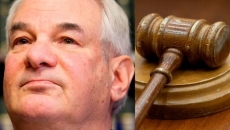OTTAWA — With employment insurance premiums set to rise in the new year, both employers and workers are calling on the federal government to step in and rescue the program from the considerable amount of debt it has fallen into since the COVID-19 pandemic.
The program, which is financed entirely through premiums paid by workers and employers, accumulated $25.9 billion of debt by the end of 2021, according to the Office of the Chief Actuary.
The rise in debt comes after a staggering number of Canadians were unemployed during the pandemic and eligibility rules for the program were relaxed to ease access to jobless benefits.
Since then, the labour market has bounced back and temporary changes to the EI program have been reversed. However, the question that lingers is: who should pick up the tab on the accumulated debt?
Employers and workers are hoping the federal government will.
“The current deficit happened because of the pandemic, and it is not the fault of any employee and it's not the fault of any employer,” said Jasmin Guénette, vice-president of national affairs at the Canadian Federation of Independent Business.
After a two-year freeze, EI premiums are set to rise by five cents per $100 of earnings in 2023, which is the maximum increase allowed in one year by legislation.
However, the increase falls short of what the Office of the Chief Actuary recommended for the program to break even by 2029.
Nancy Healey, the representative for employers on the Canadian Employment Insurance Commission, said "both business (and) labour are concerned about the amount of debt that's in the EI account right now."
The EI system is overseen by a commission that regularly reviews problems and the appeals system, as well as its financing. The commissioners bring the voices of workers and companies to the table, often consulting their constituents and raising concerns with permanent officials.
The representative for workers on the commission, Pierre Laliberté, said the federal government hasn't indicated whether it has any intention to pay off any of the debt.
"Everyone was surprised by the fact that at budget, there was no or partial compensation for the cost incurred during the pandemic," he said.
When asked whether there are any plans for the federal government to pay off some of the debt, a spokesperson for Employment Minister Carla Qualtrough said in a statement "these debts are resolved over many years, with the premium rates being determined using seven-year break-even projections."
"With the 5 cent increase, the rate will become $1.63 in 2023, which remains one of the lowest rates observed in Canada’s history," said Jane Deeks, the minister's director of communications.
Who should pay for the accumulated debt is part of a larger discussion on EI reform.
In 2021, the Liberals campaigned on a promise to modernize EI and pledged to expand the program to cover self-employed workers and address gaps, including those highlighted by the COVID-19.
Miles Corak, an economics professor at the City University of New York and longtime researcher on EI, said the reform should include changes to how the program is financed.
In a note published by the C.D. Howe Institute earlier this week, Corak made the case for tripartite funding of the program, where employers, workers and the government contribute.
He argues workers and employers shouldn't be burdened by unexpected shocks to the economy like the pandemic that cause a spike in "involuntary" unemployment.
"Sometimes workers are willing to work, are in the right place, and have the required skills, but the jobs are just not available," Corak wrote in the note, which is addressed to Qualtrough.
Corak suggests the federal government should cover increased costs to the program caused by unexpected economic shocks. At the same time, it should collect any surpluses accumulated during times of low unemployment.
Corak, who participated in public consultations held on EI reform, said both employer and workers groups seemed to react positively to his proposal.
"I'm sort of looking between the tea leaves here thinking, OK, that might be a way to get federal government financing involvement into the program," Corak said.
While the Liberals haven't given a timeline on the implementation of reform, they are expected to present their plan by the end of the year.
The idea of having the government contribute to the program isn't new. Prior to the 1990s, EI was financed through contributions from workers, employers and the federal government.
Unifor president Lana Payne says the union wants to see federal contributions reinstated "to both mitigate the accrued program deficit and support long-term enhancements to the program for workers."
However, Jennifer Robson, a Carleton University associate professor of political management, said she would be surprised if there was much enthusiasm from the federal government to contribute financially.
"My impression is that the current mood from the Department of Finance is much more one of fiscal restraint," Robson said.






